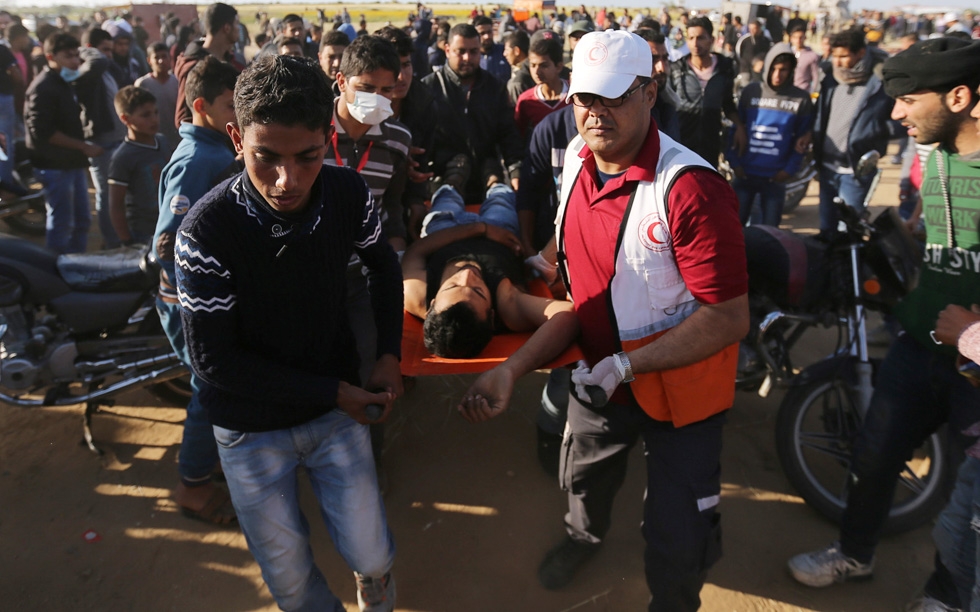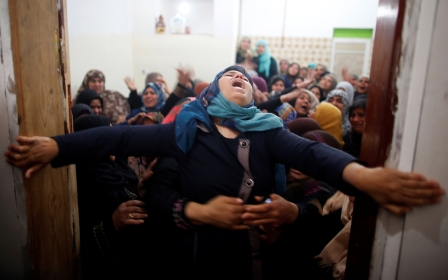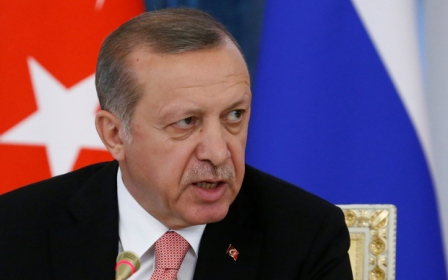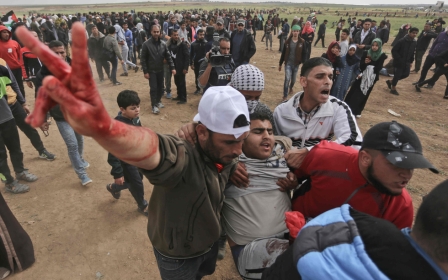Israel rejects inquiry into killing of 16 people on 'Great Return March'

Israel's defence minister rejected on Sunday calls for an inquiry into the killing of 16 Palestinians by the military during a Palestinian demonstration that turned violent on Friday at the Gaza-Israel border.
Hamas, the dominant Palestinian group in Gaza, said five of the dead were members of its armed wing. Israel said eight of the dead belonged to Hamas, designated a terrorist group by Israel and the West, and two others came from other militant factions.
UN Secretary-General Antonio Guterres has called for an independent investigation into Friday's bloodshed, which also led to 1,400 reported wounded.
His appeal was echoed by Federica Mogherini, the European Union's foreign policy chief, Amnesty International, and by Tamar Zandberg, leader of Israel's left-wing opposition Meretz party.
"Israeli soldiers did what was necessary. I think all our soldiers deserve a medal," the defence minister, Avigdor Lieberman, told Army Radio. "As for a commission of inquiry - there won't be one."
Tens of thousands of Palestinians gathered on Friday along the fenced 65km frontier, where tents had been erected for a planned six-week protest pressing for a right of return for refugees and their descendants to what is now Israel.
I think all our soldiers deserve a medal
- Avigdor Lierberman, Israeli defence minister
But hundreds ignored calls from organisers and the Israeli military to stay away from the frontier.
The military said some of those who were shot had fired at soldiers, rolled burning tyres and hurled rocks and firebombs toward the border.
However, video footage posted on social media, which could not be independently verified, appeared to show unarmed protesters being shot in the back or while praying.
In one video, a man identified by his relatives as Abdelfattah Abdelnabi, 19, is seen shot in the back while running away from the border clutching a tyre. Abdelnabi died of his wounds, the Palestinian health ministry said.
In another video, a worshipper limps away from afternoon prayers after apparently being shot in the leg.
"The use of live ammunition should, in particular, be part of an independent and transparent investigation," Mogherini said in a statement on Saturday. "While Israel has the right to protect its borders, the use of force must be proportionate at all times."
Israeli Prime Minister Benjamin Netanyahu praised Israeli troops after the violence for "guarding the country's borders".
"Well done to our soldiers," he wrote in a statement. "Israel acts vigorously and with determination to protect its sovereignty and the security of its citizens."
The protest is scheduled to culminate on 15 May, when Palestinians mark the Nakba (Catastrophe), when hundreds of thousands fled or were driven out of their homes in 1948 when the state of Israel was created.
Israel has long ruled out any right of return, fearing it would lose its Jewish majority.
On Saturday, Israeli troops using live ammunition and rubber bullets shot and wounded about 70 Palestinians among demonstrators at the border, Palestinian officials said. Witnesses said stones were thrown at the soldiers.
More than 1,400 people who had mobilised as part of the "Great March of Return" on Friday were injured, according to the Palestinian Ministry of Health.
The ministry also noted that at least 773 Palestinians were wounded with live ammunition.
Dr Ashraf al-Qidra, a spokesman for the ministry, said that "most of the dead were aged between 17 and 35".
He also told the Guardian that the remainder of the wounded, some of whom were in a critical condition, had been "shot with live ammunition".
Israel says Hamas is using the protests to deflect frustration among Gaza's two million inhabitants over deepening economic hardship.
Israel withdrew from Gaza in 2005 but, citing security concerns, still tightly controls its land and sea borders. Egypt also keeps its Gaza frontier largely shut.
Middle East Eye propose une couverture et une analyse indépendantes et incomparables du Moyen-Orient, de l’Afrique du Nord et d’autres régions du monde. Pour en savoir plus sur la reprise de ce contenu et les frais qui s’appliquent, veuillez remplir ce formulaire [en anglais]. Pour en savoir plus sur MEE, cliquez ici [en anglais].




